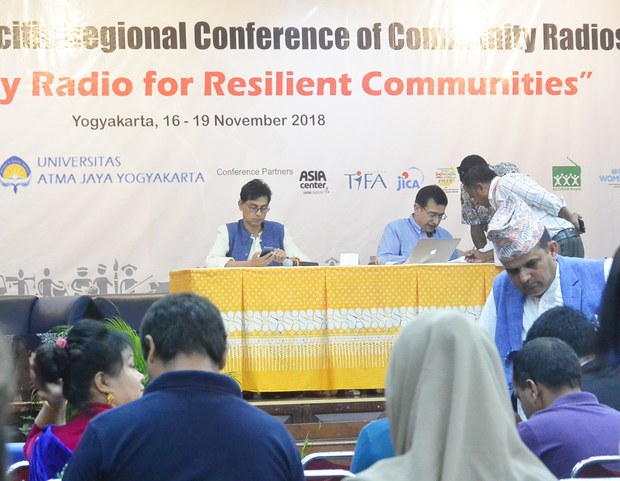Community Radio Operators in Asia-Pacific Vow to Spread Peace Over Air Waves
2018.11.19
Yogyakarta, Indonesia
 Asia-Pacific members of the World Association of Community Radio Broadcasters pledge to become messengers of peace during their four-day meeting in the Indonesian city of Yogyakarta, Nov. 19, 2018.
Asia-Pacific members of the World Association of Community Radio Broadcasters pledge to become messengers of peace during their four-day meeting in the Indonesian city of Yogyakarta, Nov. 19, 2018.
Community radio broadcasters from Indonesia, the Philippines and elsewhere in the region pledged Monday to give voice to marginalized communities and work together to create programming to counter extremism, sectarian violence and fake news.
Asia-Pacific members of the World Association of Community Radio Broadcasters (AMARC) from 11 nations upheld a collective commitment to support establishing community radios in conflict areas as a means of peace building and reconciliation, as they wrapped a four-day meeting in Yogyakarta, Indonesia.
They also agreed “to create spaces on the airwaves for indigenous peoples, refugees, displaced people, the stateless, the trafficked and diverse and marginalised voices,” the group said in a statement.
The decision by community radio operators to serve as messengers of peace was timely given that religious issues often lie at the heart of conflicts in their communities, according to Sinam M. Sutarno, chairman of the Indonesian Community Radio Network.
“Our current challenge is religion-based identity politics and we must counter it with moderate (religious) interpretations, and adopt a humanist, local cultural approach that calls for acceptance of differences,” Sinam told reporters.
Counternarratives
Rofahan, an Indonesian community radio activist at his pesantren (Islamic boarding school), expressed concern during the conference about the emergence of community radios that broadcast intolerant sermons, which, he said, could lead to radicalism among listeners.
He said he and other pesantren radio activists tried to offer counternarratives by broadcasting sermons with messages of tolerance.
“But there lies the difficulty, when we are dealing with something that is based on religion, it becomes very sensitive, so we must be careful not to create new conflicts,” he said.
Rofahan said he realized that the issue of radicalism and intolerance was a sensitive topic in relation to religion.
“Even a small issue will be brought to the realm of religion,” he said.
Charlie Saceda, emergency media and communication coordinator of PECOJON, a Philippine-based peace journalism network, said media outlets in the Philippines often grappled with misinformation as more and more people fall prey to fake news on social media.
“In the Philippines we have free Facebook but it is only limited to seeing posts. So, it’s hard to verify fake news because you have to pay to access the links,” he said.
Community radio stations need to reach larger audiences, Saceda said.
“If your community radio is very powerful, it can reach other communities. Community radios can remind people not to react to fake news right away and instead find out what really happened,” he said.
Meanwhile, in Japan, community radio stations invited their listeners to send messages of encouragement to victims of bullying, many of whom are migrants, said Kim Chiaki from FM YY in Kobe, Japan.
He said community broadcasters focused on providing motivations to the victims, rather than trying to confront bullying head-on.
“This culture of bullying is very difficult to eliminate, so we choose to encourage those who are bullied so that they can rise up and so that people can accept differences,” Kim said, through an interpreter.
Issue of radicalism
Budi Hermanto, an activist on the Indonesian Community Radio Network (JRKI), said that radicalism had only emerged recently as a topic among community radio broadcasters.
“Before, community radio activists often talked about or campaigned for tolerance, but did not actually discuss radicalism,” Budi said.
Budi said he believed none of JRKI members was spreading intolerance and radicalism in their programming.
“But it’s true that some community radio stations that are not part of the JRKI network broadcast intolerant sermons,” Budi said.
In their statement at the end of the meeting, participants also said they would continue to develop programs to support disaster planning, mitigation, response and recovery.
They also committed to zero tolerance to violence against women in their radio stations, networks and communities, and to developing programming that addresses violence against minorities.
The meeting, which ended Monday, was attended by community radio broadcasters and media practitioners from Australia, Bangladesh, Cambodia, India, Indonesia, Japan, Myanmar, Nepal, the Philippines, Thailand and East Timor.







